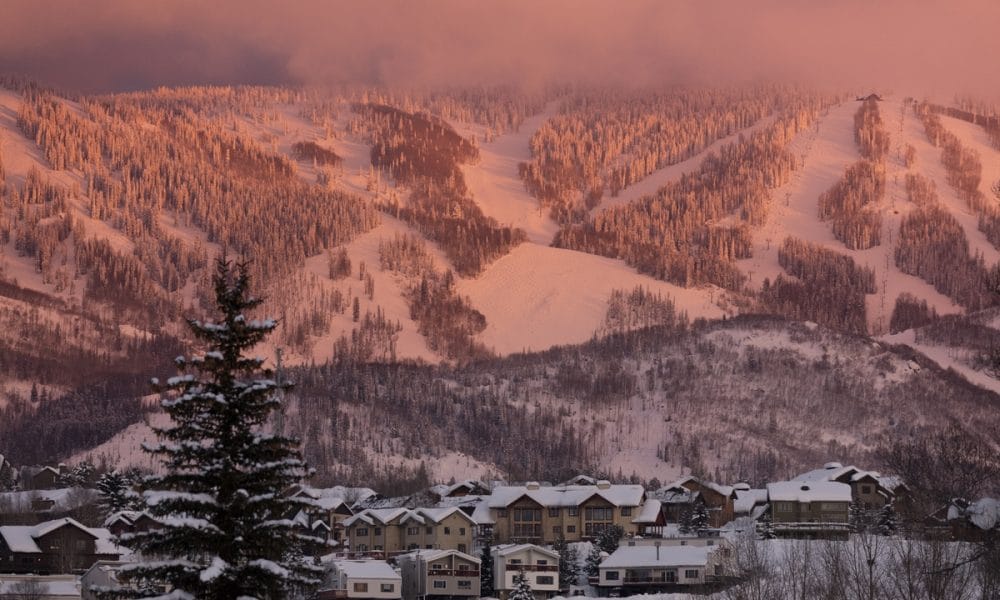[ad_1]

Steamboat Springs Bans Vacation Rentals in Additional Than Half of the Metropolis
By Paris Achen
On Tuesday, June 7, the Steamboat Springs Town Council voted 6- to move an ordinance that bans holiday vacation rentals in the the greater part of the ski resort city positioned in Northwest Colorado.
The ordinance divides Steamboat Springs into a few overlay zones: eco-friendly, yellow, and pink.
Successful June 15, small-time period rentals (STRs) are banned in the crimson zone, which addresses far more than half of the town capped in the yellow zone, and permitted without having restriction in the eco-friendly zone.
“It appears like large-handed policy pushed by emotion and not facts, and opens the metropolis up to issues of arbitrary and capricious determination creating that could kind the foundation of lawful action,” stated Robin Craigen, co-founder and CEO of Relocating Mountains, a Colorado-primarily based assets management organization, and board member for the Steamboat Springs Group Preservation Alliance (SSCPA).
On the other hand, the City Council has made an avenue for existing STRs to continue on operating in all a few zones, stated Planning Director Rebecca Bessey. This could be an critical lifeline for the 4,300 STRs in the metropolis.
STRs in the yellow and red zones that were working before June 15 may use for “legal nonconforming standing,” which would allow them to continue internet hosting visitors.
To establish that the STR was working prior to June 15, the proprietor or supervisor must post documentation of STR activity these as booking confirmations, verified stays, and remittance of profits tax. STRs with registered authorized nonconforming position may possibly proceed to function in the yellow and crimson zones, Bessey claimed.
Council users also have requested an modification that would allow for major people to brief-time period lease rooms in their properties a utmost of two times, or 30 cumulative days, for every calendar year, whichever is a lot more restrictive, Bessey claimed.
The overlay map is intended to lessen “potential destructive impacts of short-time period rentals” on the community’s housing provide, the character of residential neighborhoods, and employee shortages, according to a metropolis workers report.
Nonetheless, details implies that several of the shorter-phrase rentals affected by the ordinance would, in fact, turn into long-phrase rentals, stated Paul Forehand, a homeowner in Steamboat Springs who addressed the council on June 7.
About 3,900 out of the 4,300 properties are rented for fewer than six months of the year, with two-thirds of all those, or 2,600, rented for significantly less than three months, according to AirDNA.
“In other terms, the folks who maintain telling you they won’t alter to a prolonged-expression rental for the reason that they use their residence on their own even though renting it to nutritional supplement expenditures are telling you the truth of the matter,” Forehand stated.
“You are not heading to resolve the problem of the cost and amount of extensive-time period rentals by picking on the limited-phrase rentals.”
The council also authorized two other ordinances that set new short-expression rental licensing and running procedures, together with greatest occupancy, parking specifications, vehicle restrictions, and a dependable get together to reply to problems 24 several hours a day.
Limited-expression rentals must display a license in a obvious area inside of the premises, and occupancy is constrained to one individual for every 150 square feet, or a maximum of 16 per house.
All three ordinances take result on June 15 but deliver a six-month grace interval to give entrepreneurs time to sign up their properties.
Airbnb a short while ago unveiled a report by HR&A Advisors that quantifies quick-term rentals’ crucial purpose in Colorado’s economy and demonstrates what is at stake exclusively in Routt County, where Steamboat Springs is positioned.
The study found that in Routt County, STRs generated $179.2 million in financial output in 2020, including $65.3 million in visitor investing, 1,100 neighborhood positions, $41.6 million in worker earnings, and $4.5 million in point out and neighborhood taxes. The review also found that just 178 out of 6,800 STRs in Routt County would be cost-effective for employees if converted into very long-time period rentals.
Some house owners affected by the ban mentioned they ended up rethinking their financial commitment in the neighborhood.
“It took my wife and I 25 many years to be in a position to manage to obtain a condominium in Steamboat,” homeowner Chris Drohosky wrote in a letter to council on June 8. “… After paying for the rental, we experienced to do very long-expression rentals in buy to find the money for the home finance loan. The ultimate target was to go to short-term rentals within a 12 months so that we could also take pleasure in it with our mates and loved ones. This desire was shattered previous night time.
“We are at this time renting the condo to a attractive spouse and children at an inexpensive fee and were being about to renew their lease for another yr. Just after [the decision by council], we have decided to provide the device for the reason that the benefit will only go down and we will never be equipped to use it for ourselves.
“Your steps have not only affected us and other entrepreneurs, but we now have to inform a excellent tenant that we experienced for a few decades that they want to go in other places to come across a rental.”
The council is also thinking about sending a ballot measure to voters in November that would levy a particular tax on STRs to crank out income for reasonably priced housing. The tax price has not nonetheless been established, but council customers have discussed a amount of between 7% and 10%. They are scheduled to hold a meeting on June 20 to examine the proposed tax.
Craigen explained the SSCPA’s target will now change to opposing that tax.
“If this passes, it will have a further devastating result on regional lodging organizations who are battling inflationary pressures and dipping demand from customers as the earth opens up immediately after COVID,” Craigen reported.
[ad_2]
Resource url






More Stories
Car Rental Tips Before Planning For a Vacation Trip
Why Is It A Good Idea To Hire A Limousine?
Looking To Become An Uber Driver? Here’s Why You Should Use A PCO Rental Service